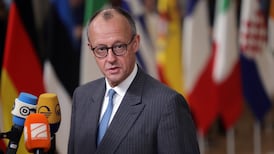Cypriot president Nicos Anastasiades is tonight holding last-minute talks with international lenders on todayy in an attempt to save the Mediterranean island from financial meltdown and possibly becoming the first country to leave the euro zone.
With Cyprus facing deadline tomorrow to avert a collapse of its banking system, Mr Anastasiades met the heads of the Eu ropean Union, the European Central Bank and the International Monetary Fund to try to secure a deal on a €10 billionbailout after a first attempt collapsed last week.
His government and Cypriot political parties remain divided, and late night talks in Nicosia broke up without a result after angry bank workers demonstrated to save their jobs.
0 of 3
Mr Anastasiades flew to Brussels in a private jet sent by the European Commission ahead of a crunch meeting of euro zone finance ministers.
The key unresolved issues were how Cyprus should raise €5.8 billion euros from its banking sector towards its financial rescue, and how to restructure the island's overgrown banks. The president and his team have a "very difficult task to accomplish to save the Cypriot economy and avert a disorderly default," a Cypriot government spokesman said.
The EU's economic affairs chief Olli Rehn said there were no good options but "only hard choices left" for the latest casualty of the euro zone crisis. With banks closed for the last week, the Central Bank of Cyprus imposed a €100 per day limit on withdrawals from cash machines at the two biggest banks to avert a run.
French finance minister Pierre Moscovici rejected charges that the EU had brought Cypriots to their knees, saying it was the island's business model as an offshore financial centre that had failed. "To all those who say that we are strangling an entire people ... Cyprus is a casino economy that was on the brink of bankruptcy," he told Canal Plus television.
Analysts say failure to clinch a deal could cause a wider financial market selloff, but some say the island's small size - it accounts for just 0.2 per cent of the euro zone's economic output - means that contagion would be limited.
“I’m expecting quite a long night,” Minister for Finance Michael Noonan said before the start of the talks in Brussels. “I think a deal will be done tonight but I think it will be late, because a lot of detail has to be worked out.”
With the stakes never so high for Cyprus, the European Central Bank is threatening to pull the plug on short-term funds propping up the Cypriot financial sector tomorrow unless a last-minute deal is struck that satisfies the island's increasingly hawkish euro zone creditors, led by Germany.
The euro zone's biggest economy is determined that the island deflates a bloated financial sector that exceeds the size of the Cypriot economy by a factor of eight.
"It is well-known that I won't allow myself to be blackmailed, by no one or nothing," said the German finance minister, Wolfgang Schäuble. "I'm aware of my responsibility for the stability of the euro. If we take the wrong decisions, we'll be doing the euro a great misservice," he told a German Sunday newspaper.
Mr Schäuble said Cyprus could not avoid very tough times. "But that is not because of European stubbornness, but because of a business model that no longer functions," he said.
In talks yesterday in Nicosia with the "troika" of EU, ECB and IMF officials, according to Reuters, Mr Anastasiades conceded a much bigger confiscation of wealthy depositors' cash. Anyone with more than €100,000 in Bank of Cyprus, the country's biggest bank, would lose 20 per cent, while similar deposits in other banks would be hit by a 4 per cent levy.
The proposed deal would still need to pass the Cypriot parliament, which last Tuesday unanimously rejected an agreement to tax savers. The parliament is expected to convene quickly if the Cypriots and the eurogroup reach agreement this evening.
The euro zone's terms for an agreement could not be changed, he added, also insisting that depositors with savings under €100,000 had to be spared.
The original rescue deal for Cyprus collapsed last week when legislators rejected proposals that included a levy of 6.75 per cent on all deposits below €100,000. Observers have warned that the haircut has damaged public trust in the euro project, because deposits under €100,000 are protected across the European Union.
Cypriot banks hold €68bn in deposits, including EUR38bn in accounts of more than €100,000. With so much of the Cypriot banking system predicated on deposits rather than wholesale debt funding, officials at the IMF, the ECB and the EU have told the Cypriot government that depositors must carry some of the pain of a bailout, or risk their savings being wiped out altogether.
About 200 Cypriot bank employees protested outside the presidential palace today chanting "troika out of Cyprus" and " Cyprus will not become a protectorate".
Agencies



















